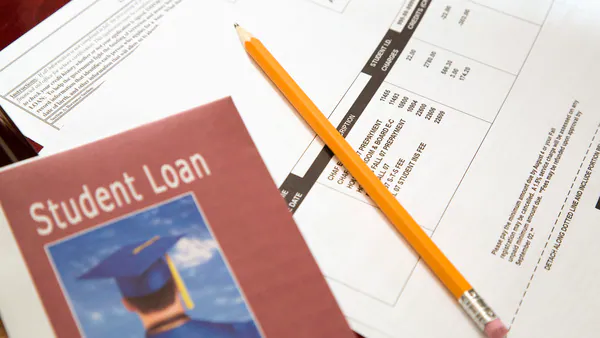In the modern world, higher education has become a necessary stepping stone toward career success. However, the increasing cost of tuition, textbooks, housing, and other expenses associated with attending college can make obtaining a degree seem out of reach for many students. Enter student loans—financial products designed to help students cover their educational costs.
Student loans are offered by both the government and private institutions and are specifically intended to help students afford college or university education. The idea is that these loans can be repaid after graduation once the borrower begins earning a stable income. But understanding the intricacies of student loans—how they work, the types available, and how to manage them—is crucial for making informed financial decisions.
This article will explore what student loans are, how they work, the different types available, and offer insights into managing them effectively. We’ll also answer some of the most frequently asked questions regarding student loans to provide clarity on common concerns.
Key Takeaway
- Student loans are designed to help finance education and have specific terms like interest rates, repayment periods, and eligibility criteria.
- Federal loans typically offer better terms, including lower interest rates and more flexible repayment options, than private loans.
- Interest rates can significantly affect the overall cost of the loan, so it’s important to shop around for the best rates.
- Loan forgiveness programs may offer relief to those in public service careers after a set number of years of qualifying payments.
- Always consider your future earning potential and how the loan repayments will fit into your financial plan.
What Is a Student Loan?
A student loan is a type of loan specifically designed to help students pay for their education. The funds from a student loan can be used for tuition, room and board, textbooks, and other college-related expenses. Unlike other loans, student loans usually have lower interest rates, and repayment terms are generally more flexible, allowing students to pay off the debt after graduation once they are financially stable.
There are two primary types of student loans:
- Federal Student Loans: These are loans issued by the government. They tend to have lower interest rates and more generous repayment options than private loans. Federal student loans come with several benefits, including income-driven repayment plans and loan forgiveness options for certain professions or under specific conditions.
- Private Student Loans: These loans are offered by private lenders like banks, credit unions, or online financial institutions. They may come with more varied terms and conditions and may not offer as many repayment flexibility options as federal loans. Private loans typically depend on the borrower’s credit score and financial background.
How Do Student Loans Work?
| Factor | Description | Why It Matters |
|---|---|---|
| Loan Amount | The amount borrowed by the student to cover educational costs like tuition, textbooks, and housing. | Determines how much debt you will need to repay after graduation. |
| Interest Rates | The percentage charged on the loan amount by the lender, either fixed or variable. | Affects the total amount you will repay over time; lower rates save you money. |
| Loan Disbursement | The process by which the loan amount is given to the student or directly to the school. | Ensures that the funds are available to cover educational expenses. |
| Grace Period | The period after graduation (typically 6 months) before repayments begin. | Provides time for graduates to find a job and start earning before they have to pay. |
| Repayment Plans | The various methods of repaying the loan, including standard, income-driven, or extended options. | Different plans can make repayment more affordable based on your income and financial situation. |
| Repayment Term | The duration over which the loan must be repaid, often 10-30 years. | A longer term results in smaller payments but more interest paid over time. |
Student loans work by providing you with the money you need to pay for your education, with the understanding that the loan will be repaid over time. However, there are several important factors to understand about how student loans function:
- Loan Disbursement:
After approval, the loan is disbursed, typically directly to the school to cover tuition and other fees. Any remaining funds can be refunded to the student for use in other educational expenses like books, housing, or supplies. - Interest Rates:
Student loans come with an interest rate that is charged on the amount borrowed. The interest rate can either be fixed (stays the same throughout the loan term) or variable (changes over time based on market conditions). Federal student loans generally offer fixed interest rates, while private loans may offer both fixed and variable options. - Grace Period:
Federal student loans usually offer a grace period of six months after graduation before repayment begins. This gives the borrower time to secure a job and prepare for payments. During the grace period, interest may or may not accrue, depending on the type of loan. - Repayment Plans:
Repayment of student loans can take many years. The standard repayment term for federal loans is usually 10 years, but this can vary depending on the loan type and plan. Private lenders often offer a range of repayment options with varying terms. - Repayment Options:
There are various repayment plans available for federal student loans, including:- Standard Repayment: Fixed monthly payments over 10 years.
- Income-Driven Repayment: Payments based on income, often leading to lower payments but a longer loan term.
- Extended Repayment: For larger loans, with the option of up to 25 years to repay.
- Graduated Repayment: Lower payments at first, with the payment amount increasing every two years.
- Loan Forgiveness:
Some federal student loans offer loan forgiveness after a certain number of years of service in public service jobs (e.g., teachers, doctors, military personnel). This is particularly beneficial for those who work in non-profit sectors or government positions. - Deferment and Forbearance:
Both federal and private student loans offer options to temporarily pause or reduce your loan payments due to financial hardship, enrollment in school, or other qualifying reasons. Interest may continue to accrue during this time, depending on the loan type.
Types of Student Loans

There are different types of student loans available to help meet the financial needs of students. The most common types include:
Federal Student Loans
- Direct Subsidized Loans: These are loans for undergraduate students who demonstrate financial need. The government pays the interest while you’re in school and during the grace period.
- Direct Unsubsidized Loans: Available to both undergraduate and graduate students, these loans are not based on financial need. Interest accrues while you’re in school, but you can choose to defer it.
- Direct PLUS Loans: Available to graduate students and parents of dependent undergraduates. These loans require a credit check and are typically used to cover educational costs that are not covered by other forms of financial aid.
- Perkins Loans (Discontinued as of 2017): These were low-interest federal loans for students with exceptional financial need.
Private Student Loans
- Bank Loans: Banks and credit unions offer private student loans, which may have variable or fixed interest rates.
- Online Lenders: Online platforms like SoFi, Earnest, and others provide private student loans, often with competitive rates, especially for students with good credit.
- Co-Signed Loans: Some private loans may require a co-signer if the student has little to no credit history.
Factors to Consider Before Taking Out a Student Loan
Before applying for a student loan, there are several key factors to consider:
- Loan Type: Understand the difference between federal and private loans, and prioritize federal loans due to their favorable terms.
- Interest Rates: Compare rates from different lenders to ensure you get the best possible deal.
- Repayment Terms: Consider the length of the repayment period and your ability to make monthly payments after graduation.
- Loan Limits: Federal student loans have annual and aggregate borrowing limits. Make sure the amount you need fits within these limits.
- Eligibility for Forgiveness Programs: If you plan on entering a public service career, explore federal loan forgiveness programs.
- Your Financial Future: Carefully consider how much you’ll owe upon graduation and how your loan payments will impact your financial situation in the years to come.
Also Read: How Do Student Loans Impact Your Life After Graduation?
Conclusion
Student loans are a critical tool for financing higher education, but they come with responsibilities that can last long after graduation. Understanding the terms and options available is crucial for managing your loan effectively and avoiding long-term financial stress. From federal loans with favorable terms to private loans offering different flexibility, there are options to suit various financial needs.
It’s essential to assess your financial situation, determine how much you can afford to borrow, and choose the loan type that best meets your goals. By being proactive in understanding how student loans work, including repayment plans, interest rates, and potential loan forgiveness programs, you can make well-informed decisions and set yourself up for success.
FAQs
- What is the difference between federal and private student loans?
- Federal student loans are funded by the government and usually offer lower interest rates and more flexible repayment options than private loans, which are offered by banks or online lenders.
- Can I apply for a student loan if I have bad credit?
- Yes, you can. Federal student loans do not require a credit check, but private loans may. If you have bad credit, you may need a co-signer to secure a private loan.
- Can I pay off my student loan early?
- Yes, you can pay off your student loan early without any penalties. However, some private loans may have prepayment penalties, so it’s important to review the loan terms.
- What happens if I can’t make my student loan payments?
- If you can’t make payments, you may qualify for deferment or forbearance. If you default on your loan, it can negatively impact your credit score and lead to wage garnishment.
- What is loan forgiveness, and do I qualify?
- Loan forgiveness programs cancel your loan debt after a certain period of time, typically for those working in public service roles. Programs like Public Service Loan Forgiveness (PSLF) offer this benefit.
- Can I consolidate my student loans?
- Yes, federal student loans can be consolidated through a Direct Consolidation Loan, which can simplify repayment. Private loans may also be refinanced or consolidated.
- How do student loan interest rates work?
- Interest on student loans accrues based on the loan amount and the interest rate. Federal student loans typically have fixed rates, while private loans may offer fixed or variable rates.




